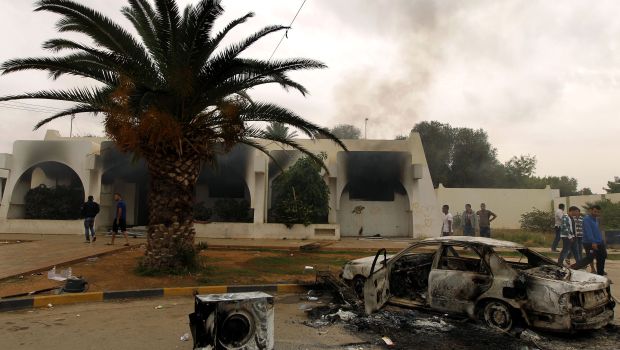
Libyan men stand outside a building used by Ansar Al-Sharia militia after it was torched by residents on November 25, 2013 in Benghazi. (AFP PHOTO/ABDULLAH DOMA)
Benghazi, Reuters—Clashes between Libyan troops and militants in the eastern city of Benghazi on Monday killed at least nine people and wounded a dozen in another test of the country’s fledgling armed forces.
Still in training, Libya’s new military is struggling to curb Islamist militants and militias who fought in the uprising against Muammar Gaddafi but refuse to disarm and control parts of the country.
Gunfire and explosions could be heard in Benghazi and thick smoke rose from the Ras Obeida area. The army ordered residents to stay off the city streets and recalled troops on leave to their units in the city.
Fighting broke out when an army special forces unit pursued a suspect into an area where Islamist militant group Ansar Al-Sharia operates its own checkpoints, Benghazi city security officials said.
Medical and security sources said at least nine people were killed in the gun battles.
Ansar Al-Sharia was blamed for the attack on the US consulate in Benghazi a year ago when the US ambassador and three other Americans were killed.
The chaos in Libya is worrying its neighbors and the Western powers who backed the uprising that led to the fall of Gaddafi two years ago in one of the Arab Spring revolts.
Prime Minister Ali Zeidan, who was briefly abducted by a militia last month, met US Secretary of State John Kerry and British Foreign Secretary William Hague in London on Sunday to discuss cooperation.
Rival militia groups withdrew from Tripoli last week after clashes killed more than 40 people when protesters marched to one of the militia bases to demand they leave the capital city.
Hoping to co-opt former fighters, the government hired militia groups to provide security. But they remain loyal to their commanders or tribes, and often clash in disputes over territory or personal feuds.
The US military, Britain, France, NATO and Turkey have all promised aid for the OPEC country’s armed forces. But most of the programs are just beginning and the military is still no match for the armed groups.
